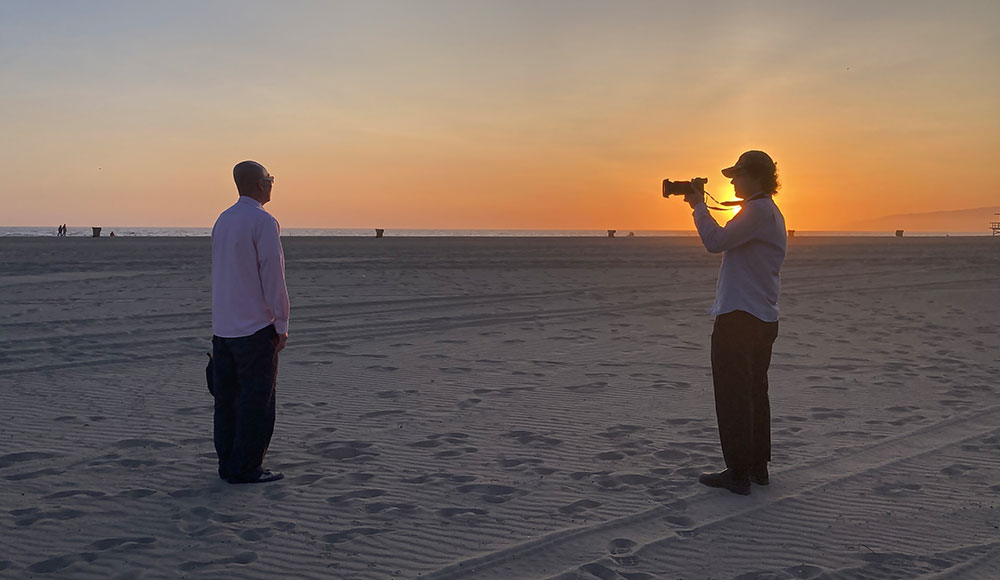We live in a world where, in America, citizens are being taken off the street, put on planes and sent to death camps in other countries. But the unjust imprisonment of our neighbors—the people we see walking down the sidewalks, often based simply on the color of their skin—is nothing new.
While our own prisons don’t yet rival the sheer horror of El Salvador, our own prisoners day-to-day, held within a country with the highest incarceration rate in the world, is shrouded in secrecy. The 2 million men, and 200,000 women, living in confinement in the USA, rarely have advocates, and their voices and stories go mostly unheard.
In 2022, film professor Sharon Daniel began teaching a class at UCSC titled “Reasonable Doubts: Making an Exoneree.” From her office on the hill, Daniel explains part of the impetus behind its inception. Marc Howard, who cofounded the class at Georgetown University, had personal reasons for his interest in the process of exonerating wrongly convicted individuals.
“It was personal,” Daniel says. “His childhood friend, Marty Tankleff [who cofounded the class with Howard], was convicted for murdering his own parents. He was arrested and convicted, but he was innocent. Marc went to college, went to law school, and got involved with Marty’s case.
“Where he was exonerated due to the help of a number of great people. And then, Marty became an attorney after he was released from prison,” Daniel continues. “And together they came up with this concept for the class, where undergraduate students would work in small teams to reinvestigate potential cases of wrongful conviction and make short documentaries about the cases.
“I got involved in 2022. I heard them talking about their class on a podcast and I was looking for help to find a representation for a gentleman on death row in San Quentin who I was working with,” Daniel recalls. “I was doing a documentary project about his case of wrongful conviction, and we decided to partner. And for the first two years, my students at UCSC collaborated with Georgetown students. We would work together on the cases.”
Originally, the class at Georgetown had classmates studying the law and handling the investigations. When the class expanded to Princeton University, and then to UC Santa Cruz, those Georgetown students were still relied on for their legal expertise.
“At this point, we’re no longer collaborating on the cases with the Georgetown students,” Daniel says. “We have our own four cases. This year, my students are doing all the legal research and reinvestigation, as well as the filmmaking and media making part of the class.”
Wrongful incarceration and overly harsh sentences are no longer just an occasional problem, but are part of an epidemic. Citizens’ lives are being shattered. “One of the cases that we’re working on this year is a case of two very young co-defendants,” Daniel explains. “They carjacked a person to try to get money. One of the young men had a baby to take care of, and no opportunities to get food. They took the woman in her car to the bank, and asked her to take out some money for them. She did that. And then they asked her where she wanted to be dropped off. They took her there, left her in the car. Nobody was harmed, and they got life-without-parole sentences.”
UCSC student Sarina Bozorgnia, 20 years old, was pursuing a major in film. She then switched to the History of Arts and Visual Culture when she heard about the Visualizing Abolition Program that would count toward her certificate. “My mom was a film critic in the UAE [United Arab Emirates],” Bozorgnia begins. “So, I grew up on a lot of film sets. My mom’s organization is called Documentary Voices.” Documentary Voices is the only film initiative dedicated to documentaries in the UAE.
Bozorgnia has been involved in social justice abolition work since her junior year. This important class combined two of her interests: film and social justice. “The case I got involved with had me communicating with them by phone for ten weeks. For our spring break, we traveled down to interview their friends and family, and then we were able to meet them in person. I consider them my friends. It was heartbreaking to see these amazing people in prison. It’s modern-day slavery,” Bozorgnia says.
According to the young filmmaker, the Exoneree program is so important because it shines a light on some of the amazing people who exist within the walls of our prisons. “There are people who don’t belong there and don’t deserve to be there. There’s a ripple effect when you take somebody out of their community. It impacts generations and generations of families. And our system really, really abuses prisoners. I hope people come to see our documentaries,” Bozorgnia concludes.
Making an Exoneree, Screening and Celebration will take place May 27 at 7pm. It will be screened in the Digital Arts Research Center 108, 407 McHenry Road. The event is free and is also available with live streaming. More information at calendar.ucsc.edu.












Great article, other than the fact that the following is not an accurate statement, “Marc Howard, who founded the class at Georgetown University,”
Marc Howard and I co-founded the class at Georgetown.
Please update the article to reflect the facts.
Martin,
Author of article here. Sorry about that – I know the origin story very well – amazing and inspiring. Thank you for your continued work and voice. DNA
The Good Times never runs out of victims in need of social justice.
Except, of course, the Palestinians — most of the world realizes they are the victims of nothing less than genocide.
Why does the Good Times continuously & completely ignore the millions of victims of Israel lobby war criminals?
We all know why, don’t we.
Free Palestine! Stop the Genocide!